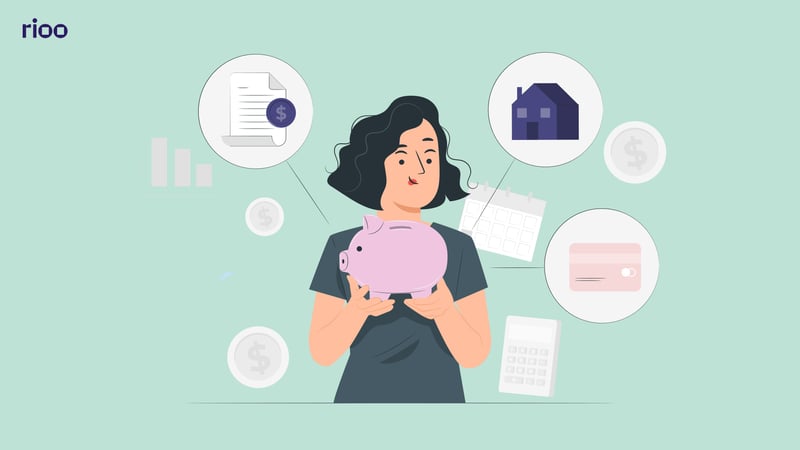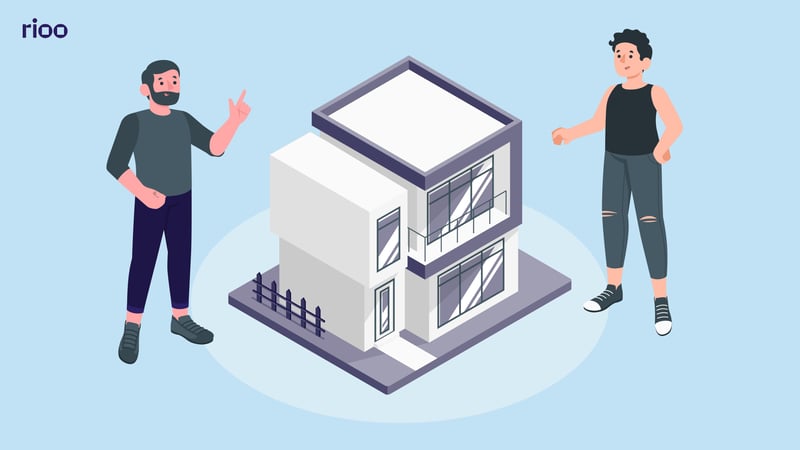Managing a property comes with the challenge of controlling operational costs while maintaining quality service for tenants. The question property managers often face is: How can they reduce costs without sacrificing quality?
The solution lies in adopting strategic practices that streamline operations. Technology, especially property management software, plays a crucial role. In fact, studies show that 53% of property managers report spending less on operations after adopting property management software, with an average time savings of 15 hours per week.
This blog will cover the strategies property managers can use to cut costs, increase efficiency, and maintain tenant satisfaction while improving profitability.
Key Takeaways
- Adopting property management software and automation tools reduces operational costs and saves time by streamlining routine tasks like rent collection, maintenance, and tenant communication.
- Regular inspections and proactive maintenance prevent costly repairs, extend asset life, and reduce emergency maintenance expenses.
- Consolidating vendor services and negotiating contracts can lead to significant cost savings while improving service quality.
- Tracking expenses carefully and leveraging tax deductions can help property managers reduce taxable income and lower overall financial liabilities.
1. Use Technology to Lower Costs and Optimize Operations
One of the most effective ways property managers can cut costs is by integrating technology. Implementing automation and smart systems helps eliminate many manual, time-consuming tasks that typically require extra staff and resources.
Here’s how technology can help property managers cut costs:
- Energy Management Systems: Use smart thermostats and energy-efficient appliances to reduce utility costs. Smart meters allow property managers to track energy consumption in real time and adjust settings based on occupancy, ensuring that energy isn’t wasted.
- Cloud-Based Software Solutions: Cloud-based property management software can centralize operations, making it easier to manage tasks like lease renewals, maintenance tracking, and financial reporting. These systems reduce administrative costs by minimizing paperwork, streamlining communication, and improving data accessibility.
By integrating these technological solutions, property managers can lower costs, increase efficiency, and reduce the chances of errors, ultimately improving both profitability and tenant satisfaction. With RIOO’s cloud-based platform, you can manage leases, track maintenance, and oversee communities from one place, giving you a clear overview of your properties while reducing costs and simplifying daily operations.
Read More: From Paperwork to Portals: How Technology is Reshaping Move-Ins and Move-Outs
2. Prevent Costly Repairs with Routine Maintenance
Proactive maintenance is key to cutting costs in property management. By addressing minor issues before they escalate into major repairs, property managers can save a significant amount of money in the long run.
Routine maintenance helps identify potential problems early, reducing the likelihood of expensive emergency repairs. Some key ways to reduce maintenance costs include:
- Regular property inspections: Schedule frequent inspections to check for small issues such as leaks, worn-out appliances, or pest problems before they require costly fixes.
- Scheduled HVAC servicing: Regularly maintain heating and cooling systems to ensure they run efficiently, extending their lifespan and reducing energy consumption.
- Preventive plumbing and electrical checks: Inspect plumbing and electrical systems regularly to catch leaks, faulty wiring, or potential hazards early.
By staying on top of these routine tasks, property managers can optimize asset life and prevent major breakdowns. Not only does this save money, but it also keeps tenants happy by ensuring that their living spaces remain safe and comfortable. With RIOO, property managers can stay proactive, scheduling inspections, tracking requests, and monitoring asset health in real time. This makes routine maintenance easier, extends the life of property assets, and helps prevent costly repairs.
Also Read: The Hidden Costs of Skipping the Details in Property Setup
3. Simplify Vendor Management for Better Rates
Managing multiple vendors can be time-consuming and costly. One of the easiest ways to reduce expenses is by consolidating services and streamlining vendor relationships.
Here’s how property managers can make vendor management more cost-efficient:
- Consolidate services: Instead of working with separate vendors for maintenance, pest control, and landscaping, consider bundling these services with one or two trusted providers. This not only simplifies the management process but can also lead to discounts.
- Negotiate better contracts: Review vendor contracts regularly and renegotiate terms to ensure the services provided align with current needs. Seek discounts for long-term agreements or high-volume services.
- Establish performance-based agreements: Incentivize vendors to meet specific service goals, such as response times or quality standards, to ensure you get value for money.
By reducing the number of vendors and optimizing contracts, property managers can save money while ensuring they still get high-quality services for their properties.
4. Optimize Your Workforce for Greater Efficiency
Labor costs are a significant expense in property management, but with the right strategies, they can be reduced without sacrificing quality. By optimizing your workforce and embracing more efficient operational processes, property managers can maintain high service standards while minimizing unnecessary labor costs.
Here are some ways to achieve this:
- Use property management software: Utilize software to automate routine tasks such as lease renewals, rent collection, and maintenance tracking. This reduces the need for additional administrative staff and lowers operational costs.
- Outsource non-core tasks: For specialized tasks such as accounting, legal services, or even certain maintenance jobs, outsourcing can be more cost-effective than hiring full-time staff.
- Cross-train staff: Train your employees to handle multiple roles. This increases flexibility and allows staff to step in when necessary, ensuring there are no gaps in service while keeping staffing levels lean.
By reshaping how teams work, property managers can save on labor costs without sacrificing service. The focus shifts from adding more staff to making the most of the talent already in place.
5. Cut Overhead by Reevaluating Office Leases
Office lease expenses are often one of the largest fixed costs for property managers. Reevaluating office space needs and renegotiating leases can significantly reduce overhead and free up resources for other operational priorities.
Consider the following strategies to reduce office-related costs:
- Evaluate office space utilization: Review the size and location of your office space to determine if it aligns with your current business needs. If not, consider downsizing or moving to a more affordable location.
- Negotiate better lease terms: Contact your landlord to negotiate more favorable lease conditions, such as lower rent or reduced utility costs. If possible, consider seeking a longer-term lease in exchange for a better rate.
- Embrace remote work: If office space is underutilized, implement remote working options for staff. This reduces the need for large office spaces and cuts down on associated expenses like utilities and office supplies.
By optimizing office space and renegotiating lease terms, property managers can lower rent and utility costs, contributing to overall cost savings.
6. Lower Utility Bills with Energy-Efficient Upgrades
Energy costs can take a big bite out of a property manager’s budget, but there are several ways to reduce these expenses while also benefiting the environment. By investing in energy-efficient upgrades, property managers can significantly lower utility bills and even qualify for rebates or incentives.
Here are a few strategies to reduce energy costs:
- Upgrade to LED lighting: LED lights use less energy and last much longer than traditional incandescent bulbs. This simple change can result in noticeable savings on electricity bills.
- Install smart thermostats: These thermostats allow property managers to control heating and cooling remotely, ensuring that energy isn’t wasted when units are empty or during off-peak hours.
- Improve insulation and windows: Insulating walls and upgrading to energy-efficient windows help regulate temperature and reduce heating and cooling costs, especially in older buildings.
By making these energy-efficient upgrades, property managers can reduce utility costs while increasing tenant comfort and satisfaction.
Read More: The Real Impact of Smart Utility and Asset Management on Property Performance
7. Screen Tenants to Avoid Future Expenses
Tenant selection plays a crucial role in controlling costs in property management. Screening tenants thoroughly ensures that you avoid problems like late payments, property damage, and high turnover, issues that can lead to significant financial losses. By carefully choosing reliable tenants, property managers can reduce the likelihood of future expenses.
Here’s how effective tenant screening helps minimize costs:
- Prevent late payments: By checking financial backgrounds, you can ensure tenants have a history of paying rent on time, reducing the need for costly late fee collections and eviction processes.
- Minimize property damage: Screening for tenants who respect property conditions helps avoid costly repairs and maintenance due to misuse or neglect.
- Reduce turnover costs: Tenants who are carefully selected for stability and reliability are more likely to stay longer, minimizing vacancy rates and the costs associated with finding new tenants.
A solid tenant screening process helps property managers ensure that their properties are occupied by responsible individuals, reducing the risk of costly disruptions.
Read More: The Best Way to Keep Owners in the Loop During Leasing Transitions
8. Maximize Tax Savings Through Expense Tracking
Tracking and managing expenses meticulously can lead to significant tax savings for property managers. Many property-related expenses, including maintenance costs, utility bills, and office supplies, are tax-deductible, which can help lower your overall tax liability.
Here’s how effective expense management can lead to savings:
- Track every deductible expense: Ensure you keep detailed records of all property-related expenses, such as repairs, utilities, and management costs. This can help you maximize tax deductions and reduce taxable income.
- Use software for better tracking: Property management software can help track all expenses in one place, making it easier to identify what can be deducted come tax time.
- Plan for tax deductions: Consult with a tax professional to ensure you’re taking advantage of all possible deductions, including energy-efficient upgrades and property-related maintenance.
By staying organized and planning ahead, property managers can reduce their tax liabilities and keep more revenue for reinvestment or savings.
9. Automate Property Management Tasks for Cost Reduction
Automating routine tasks can significantly reduce the amount of time and resources spent on day-to-day property management operations. By implementing property management software and automation tools, property managers can streamline processes, reduce manual work, and cut costs.
Here are some ways automation can help reduce costs:
- Automated rent collection and reminders: Set up automatic payment systems that ensure rent is collected on time without requiring manual intervention, reducing the need for follow-up and administrative effort.
- Maintenance tracking and scheduling: Use automated systems to track maintenance requests, assign tasks to the appropriate vendors, and schedule regular inspections, reducing the need for constant management oversight.
- Lease renewals and document management: Automate lease renewals and document management, ensuring that contracts are updated and stored electronically, which reduces paper costs and administrative overhead.
- Communication Tools: Automating tenant communication with chatbots, automated emails, and notifications saves time and ensures tenants are always informed about important updates, without requiring constant manual effort from property managers.
With RIOO’s automation tools, property managers can simplify rent collection, track maintenance, and schedule services with ease. From lease renewals to upkeep intelligence, everything runs smoothly in one platform, reducing manual effort, cutting costs, and keeping operations on track.
10. Prepare Financially for Big Expenses to Avoid Emergencies
Planning ahead for capital expenditures and maintaining an adequate reserve fund can help property managers avoid financial stress when unexpected expenses arise. Whether it’s a major repair or an emergency situation, being financially prepared can minimize downtime and save money in the long run.
Here’s how to stay financially prepared:
- Schedule regular capital planning: Identify potential large expenses, such as roof repairs, HVAC replacements, or significant upgrades, and set aside funds in advance to cover these costs.
- Maintain a reserve fund: Having a reserve fund ensures that money is available when unforeseen issues arise. This prevents the need for emergency loans or credit, which often come with higher interest rates.
- Plan for seasonal expenses: Anticipate seasonal maintenance needs, such as snow removal or pest control, and budget accordingly to avoid last-minute scrambling for funds.
By maintaining a clear financial plan and reserve fund, property managers can handle major expenses efficiently without compromising the property’s cash flow.
Also Read: How Streamlined Financial Tracking Cuts Down Operational Waste in Property Management
Conclusion
Reducing costs in property management doesn’t mean sacrificing quality or tenant satisfaction. By using technology, performing routine maintenance, and optimizing vendor relationships, property managers can cut operational expenses while maintaining high service standards.
Additionally, implementing strategies like workforce optimization, automation, and financial planning can lead to improved efficiency and profitability.
And for a seamless, all-in-one solution that streamlines your operations and increases tenant satisfaction, optimize your property management with RIOO. Trusted by property managers overseeing 150,000+ homes, managing $150M+ in monthly rent, and supporting 400,000+ tenants across 1,500+ communities, RIOO’s cloud-based platform simplifies everything from automated rent collection to maintenance management.
With features like real-time financial tracking, predictive maintenance, and customizable dashboards, RIOO helps you reduce costs, improve efficiency, and enhance tenant satisfaction.
Book your personalized RIOO demo now.
Also Read: The Hidden Costs of Skipping the Details in Property Setup
FAQs
- How can I reduce property management costs without affecting tenant satisfaction?
To reduce costs while keeping tenants happy, focus on optimizing operations with technology and automation, like online rent payments and automated maintenance requests. Regular maintenance, energy-efficient upgrades, and streamlining vendor contracts can also help lower costs without compromising quality. - What technology tools should I invest in to cut costs in property management?
Invest in property management software like RIOO for automating tasks like rent collection, maintenance tracking, and tenant communication. Smart systems for energy management, such as programmable thermostats, smart meters, and LED lighting, can help reduce utility bills and enhance operational efficiency. - How can I prevent expensive repairs from draining my budget?
By implementing a preventive maintenance plan, you can catch minor issues early before they become costly repairs. Regular property inspections, HVAC servicing, and proactive plumbing and electrical checks help extend the life of your assets and avoid expensive emergency fixes. - How do I ensure I’m selecting the right tenants to avoid costly issues later?
Tenant screening is crucial to reducing future costs. Check references, credit histories, and rental backgrounds to ensure you're renting to reliable tenants. Screening helps prevent late payments, property damage, and frequent turnover, all of which can incur additional costs. - What can I do at tax time to maximize savings for my property management business?
Carefully track all property-related expenses throughout the year, including maintenance, utilities, and upgrades. Proper expense management ensures you’re maximizing your tax deductions. For example, energy-efficient improvements, property repairs, and maintenance can be deducted to lower taxable income.
















